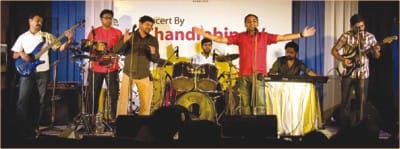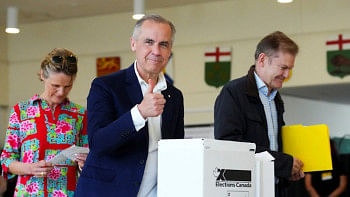Singing nonsense verses with Chandrabindoo

Photo: Mumit M.
Some labelled them as “nonsense verses,” while others find the lyrics to be satire on contemporary society -- call it whatever you will but Chandrabindoo seems to be highly successful in capturing the essence of contemporary Kolkata life with their songs.
The band released its debut album “Aar Jani Na” in 1997, though its journey began in 1989. Chandrabindoo has released seven more studio albums; mostly hits which established the band as a big player in the Kolkata music scene.
Chandrabindoo visited Dhaka recently. The band performed live on Desh TV's studio concert “Call-er Gaan” on the third day of Eid. The band also played at Dhaka Club the following night. Chandrabindoo, which comprises Upal, Anindya and Chandril, shed light on its musical journey, philosophical aspects of its lyrics, contemporary Kolkata music scenario and more.
Chandrabindoo is well known for Chandril's satirical, colloquial lyrics, full of references to current affairs and cultural phenomena around Kolkata.
“Our songs certainly represent us; we even love to mock each other. There is no particular reason behind such lyrics. They come spontaneously to us, which later turned into the signature style of the band,” said Chandril about their unique songs.
Songs such as “Conductor”, “Juju”, “Mangal Graha”, “Aar Jani Na”, “Bhalo Lagey Na”, “Gaan Bhalobeshey Gaan” and “Twaker Jatno Nin” are from the band's repertoire that feature satirical verses.
“I think two decades after we appeared on the scene and with eight albums to our credit, we can say that we've created our own space with our own musical dialogues,” said Anindya.
“We don't only sing satirical songs. We have a good number of romantic songs as well that are equally popular among our fans,” Anindya continued and added that in some cases they invite guest artistes to sing with them.
They cite the release of their fourth album “Chaw” (2001) for which the band invited noted singer Lopamudra Mitra to sing “Adorer Nouko”. The poetic lyrics by Chandril juxtaposed with a melancholic tune by Upal turned the song into one of the most popular numbers of the band.
Their romantic numbers include “Mounomukhorota”, “Dupurer Khamokha Kheyal”, “Eita Tomar Gaan”, “Mon”, “Uthey Jawa Shiri” and “Bhin Deshi Tara”. Anindya mostly writes romantic songs. In some cases Chandrabindoo also renders songs that make one nostalgic: among them are “Neel”, “Adda”, Bondhu Tomae” and “Bus-stop-e Keu Nei”.
When asked about the evolution of rock music in Kolkata, Upal affirms that Kabir Suman's early 1990s' emergence set the platform for the contemporary rock acts. However, Suman created a unique genre in modern day Bangla songs and it is obviously not just “rock”.
“When we first heard Suman, his songs seemed to give us some confidence,” said Upal.
Though it is widely regarded that Moheener Ghoraguli initiated the rock genre in Kolkata in early 1970s, Chandrabindoo feels that the band could not fill the void between the late 1970s and early 1990s. “Suman started with a new promise. People first started to accept this kind of music [apart from adhunik and film songs] after Suman come on the scene,” said Anindya.
At present Kolkata bands are more active than in the recent past, and a lot of groups are working in the film industry, said Anindya. He finds this change occurred after the success of Aniruddha Roy Chowdhury's national award winning film “Antaheen” (2009). Anindya and Chandril worked for the film and won a Best Lyrics award for the song “Pherari Mon”. Shreya Ghoshal won a Best Female Playback Singer award for the song. Chandrabindoo's popular number “Bhindeshi Tara” was also used in the film.
Currently the band is working on its e-magazine “e-Aarki”. The band plans to release its ninth album next year. It is open to the prospect of accepting an offer from any Bangladeshi label for its next album, said its members.
Chandrabindoo's other members are Arup (bass guitar), Surojit (lead guitar), Rajshekhar (drums), Shibu (keyboard) and Sourabh (percussion).

 For all latest news, follow The Daily Star's Google News channel.
For all latest news, follow The Daily Star's Google News channel. 



Comments